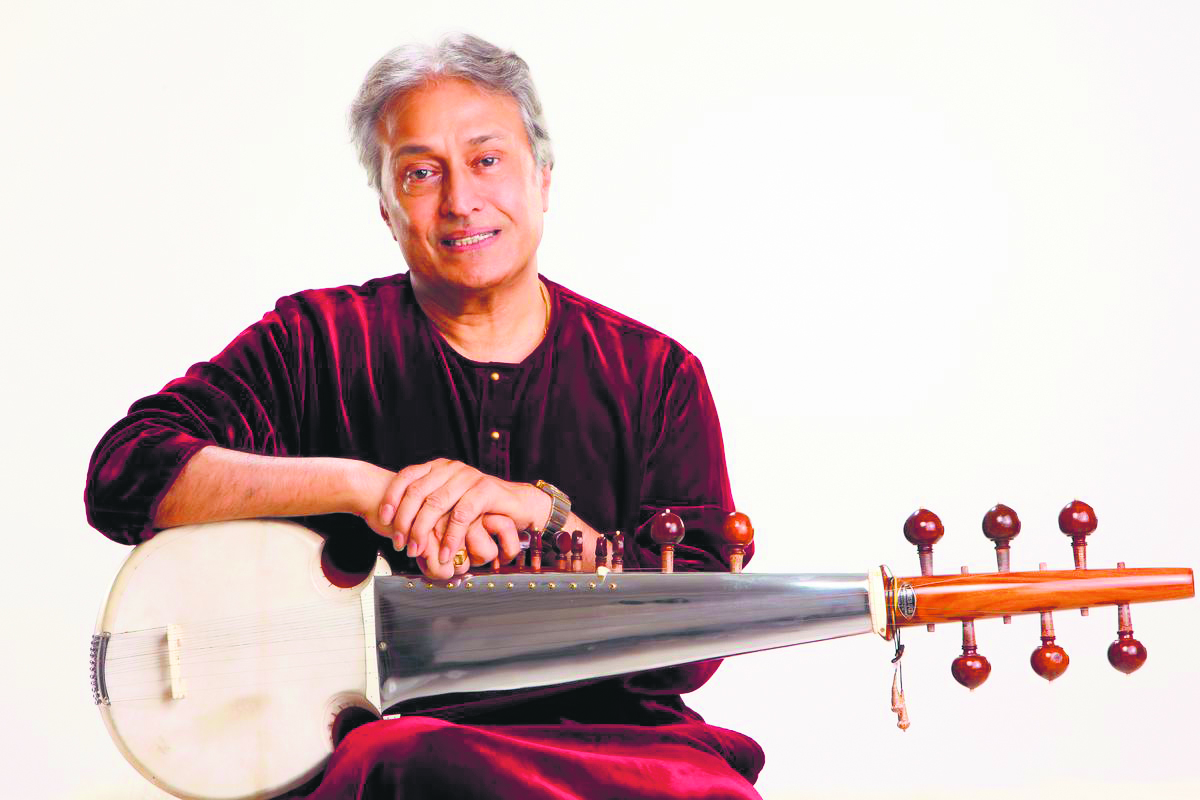The prominent sarod maestro from India openly discusses his passion with “The Daily Guardian” and highlights the exceptional lineage he inherited. Khan emphasizes the lack of a definitive guide for presenting Indian classical music and asserts that music, being essential for humans, naturally draws them towards it.
Excerpts
Q. What is music and what inspired you to pursue a music career, particularly the sarod?
A. I cannot remember a particular day that I was initiated into the world of music. It was a part of me from as early as I can remember. Indeed, I cannot think of a moment when music has been separated from my life. Life itself was Music and Music was Life. Music is a celebration of life. Since my childhood, I always wanted my instrument, the Sarod to be able to express the entire range of human emotions…to Singing, shouting, whispering, and crying.
Q. Can you describe your practice routine and how it has evolved over the years?
A. Like cosmic divinity, music knows few barriers or boundaries. I have always admired and enjoyed listening to European classical musicians like Beethoven, Bach, Brahms, and Russia›s Tchaikovsky. Our renditions are often compared with jazz, which is not misplaced. There is scope for improvisations in both the disciplines, but in a different manner. The message of Indian Classical music is freedom within the discipline. Right from my childhood, I understood the vastness and the oceanic depths of music. I feel that the twelve musical notes are so very powerful and vibrant like the sun and all the harmony around it is like its rays. Instrumental music transcends all barriers. I wish to have music shape the consciousness in a way that contributes to oneness in children, it must be more practical and less theoretical! Music is the greatest wealth that I inherited from my forefathers; one that I am constantly sharing. Music is not a profession but a passion. A way of life! Creative fields don’t have formulas or methods.
Q How do you navigate the balance between preserving tradition and exploring innovation in your music?
A. A wonderful and strange mystery of Indian classical music is the fact that one can spend a lifetime trying to attain knowledge and perfection and still feel that one has only touched a mere drop of an ocean. There is an old saying Swara hi Eshwar hai. In every culture, Music has its roots in spirituality. Music has always been an internal part of the worship of God. In our family, we never impose anything and we rather give them the opportunity they should enjoy any kind of music. In our lives, our wealth is music. That is why we share music with our children. Music has a significant therapeutic effect on both people and the environment. Classical music today is very much at the peak of its power. This was always an art form that reinvented itself every decade.
Q. Could you highlight a particular collaboration or performance that holds special significance for you?
A. My Sarod Concerto Samaagam has been a very memorable journey. Samaagam as we know comes from a Sanskrit word meaning confluence or flowing together. The aim was to preserve the essence of both Indian and Western traditions so that they could flow into each other without artistic compromise. The aim is through this process to joyfully explore the common musical “DNA” of both traditions. Over years, the concerto has been performed by Britten Sinfonia, Welsh National Opera, Chicago Philharmonic Orchestre National d›lle de France, Orchestre d›Auvergne, London Philharmonia, Gulbenkian Orchestra and Scottish Chamber Orchestra. Recently, the Norwegian Radio Orchestra played this piece with conductor Maestro Markus Lehtinen. We also presented Samaagam at the UN Day Concert 2018 with the Refugee Orchestra Project and with the New Jersey Symphony in April 2019 with Conductor Xian Zhang. The same year Norwegian Radio Orchestra and Moscow State Philharmonic played the Concerto and Atlanta Symphony Orchestra last month.
Q. How do you believe technology has impacted the landscape of Indian classical music?
A. In 2023, I feel that Classical music in general is at the peak of its powers. Be it overseas or in India, concert halls are selling out in Maharashtra, Bengal, and in the South and there are thousands of people coming (to watch it), it is available on Spotify, YouTube, etc. Hence, the future is bright and we have no dearth of talent. Practice, be patient, and have perseverance. Music cannot be promoted. Music is not Coca-Cola or a toothpaste (product) that you can promote, music grows on you. When it is a sold-out concert, we should realize and believe music is essential for human beings and hence they come for it.
Q. Could you share some insights into the cultural significance of the sarod and its evolution over time?
A. It has been a long journey so far and by the benevolence of the heavens, the Sarod has become far more expressive than it was 25 years ago. Those moments are a profound reminder of the blessing it is to be in the position of loving—and living—your life’s work. Without a doubt, music is the best way to connect to the supreme power that we have never seen. Across cultures and faiths, music has always been the pathway to spirituality.







